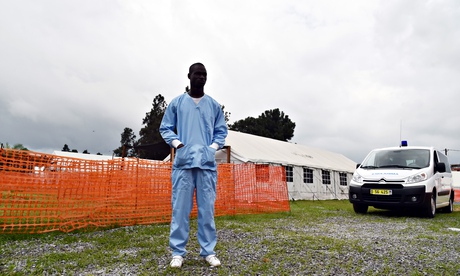
A third potential Ebola vaccine could be tested on healthworkers in west Africa in December following the announcement of funding to speed it through its first-ever human safety trials.
The vaccine, called rVSV-EBOV, was developed by the Public Health Agency of Canada. So far it has been tested only in monkeys, but in the hope that it could prove effective, 800 vials have been donated by the Canadian government. The safety trials – in which people at no risk of catching Ebola are vaccinated to ensure there are no serious side-effects – will start imminently in Germany, Switzerland, Gabon and Kenya.
The Wellcome Trust is donating £3.1m to enable the collection of safety data, overseen by the World Health Organisation.
“Several crucial pieces of the jigsaw are falling into place in terms of the global leadership and action required to turn this epidemic around,” said Dr Jeremy Farrar, director of the Wellcome Trust. “Communities in west Africa continue to suffer from the crisis with remarkable fortitude and finally the rich world has committed significant finance and resources to support critical public health measures, and progress in the search for treatments is encouraging.
“Now, accelerated vaccine development is being properly prioritised too, so we have the best possible chance of a safe and effective vaccine in time to transform our prospects of containing Ebola.”
The Wellcome Trust’s experts describe the VSV vaccine candidate as one of the most promising. There are two others that are more advanced in clinical trials – one made by the British company GlaxoSmithKline and the other by Johnson and Johnson. Both will move into trials in west Africa, probably in health workers and burial teams, in December.
The Canadian vaccine uses a weakened form of live vesicular stomatitis virus, a pathogen found in livestock which has been used in other vaccines and elicits a strong response from the body’s immune system. It will have been modified so that the gene for the outer protein of VSV is replaced with a segment of the gene for the outer protein of the Zaire Ebola virus species.
Although it is expected to produce a good immune response against the Ebola virus, there are questions over the possible side-effects, which could include fever – one of the earliest symptoms of Ebola and also malaria.
